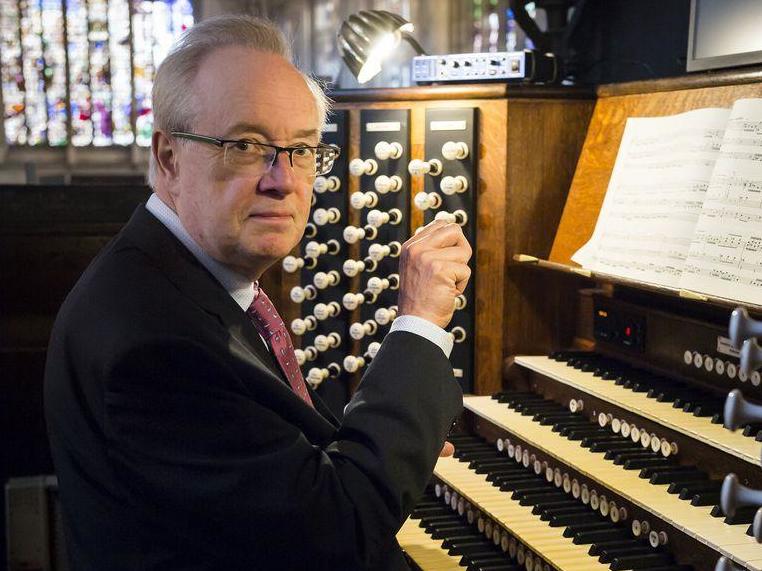Stephen Cleobury: Choral conductor who brought energy and vitality to sacred music
The director of music at King’s College, Cambridge, he presided over the annual Christmas Eve radio broadcast of the ‘Service of Nine Lessons and Carols’

Your support helps us to tell the story
From reproductive rights to climate change to Big Tech, The Independent is on the ground when the story is developing. Whether it's investigating the financials of Elon Musk's pro-Trump PAC or producing our latest documentary, 'The A Word', which shines a light on the American women fighting for reproductive rights, we know how important it is to parse out the facts from the messaging.
At such a critical moment in US history, we need reporters on the ground. Your donation allows us to keep sending journalists to speak to both sides of the story.
The Independent is trusted by Americans across the entire political spectrum. And unlike many other quality news outlets, we choose not to lock Americans out of our reporting and analysis with paywalls. We believe quality journalism should be available to everyone, paid for by those who can afford it.
Your support makes all the difference.Sir Stephen Cleobury, who has died aged 70, was among the ablest of that group of musicians who emerged from Cambridge University throughout the latter years of the 1960s. He became one of the defining choral conductors of his generation, bringing the choir of King’s College, Cambridge to a level of excellence that had few, if any, equals.
Born in Bromley, Kent, the eldest of three children of a medical practitioner, Stephen John Cleobury began his musical career as a chorister at Worcester Cathedral. Awarded a music scholarship to the King’s School, Worcester, he also had organ lessons with Christopher Robinson. Elected to an organ studentship at St John’s College, Cambridge in 1967, while there his tutors included George Guest, David Willcocks and Peter le Huray. Appointed organist of St Matthew’s Church, Northampton in 1971, he also served as director of music at Northampton Grammar School and conductor of the Northampton Bach Choir.
In 1974 he then took on the role of sub organist at Westminster Abbey. Particularly in his weekly organ recitals, he revealed an unusually sensitive musicality that made his playing more than ordinarily informed. His 1977 premiere of Malcolm Williamson’s challenging new organ work The Lion of Suffolk, performed as part of the memorial service for Benjamin Britten, added considerable lustre to his burgeoning reputation.
Twelve months later he became the first Anglican to be appointed master of the music at Westminster Cathedral. For the visit of Pope John Paul II to Britain in 1982, Cleobury was responsible for the music of the opening service at the cathedral and at an open-air mass at Wembley Stadium.
Later that year he succeeded Philip Ledger as director of music at King’s College, Cambridge. While intent on adding extra incisiveness to rhythm, diction and choral ensemble, Cleobury consolidated rather than altered the traditional King’s sound. He expanded its schedule of concerts, broadcasts and recordings. In 1993 the choir made its debut at the Henry Wood Promenade Concerts. Throughout, he was determined to persuade contemporary composers to contribute to the choral repertoire, particularly the Christmas Eve broadcast of the Service of Nine Lessons and Carols.
Cleobury and the choir also produced a number of award-winning DVDs, bringing a touch of Anglicanism to the world of Rachmaninov, and infusing Palestrina with bright, clean, balanced textures that were transparent and rhythmically precise.
Cleobury’s own solo discography includes organ recordings made at both the Abbey and King’s College. He claimed no special merits as a composer, but his feel for the liturgy allowed him to write well for voices. Of the anthems, two in particular stand out, “I Waited Patiently for the Lord” and “Oculi, Omnium”. Each is refined, disciplined and meticulously crafted. No less so were his settings of 23 Hymns For Choirs. Of his carol arrangements, each seemingly designed with his own choir firmly in mind, two volumes of Christmas descants, Sing Choirs of Angels, allowed enterprising choirs the opportunity to emulate the peerless King’s sound. Far more expansive was his realisation of the traditional Joys Seven, all culminating in an inspirational evocation of seasonal splendour.
Conductor of the Cambridge University Musical Society from 1995 until 2007, Cleobury was also chief conductor of the BBC Singers. In demand for concerts, master classes and workshops worldwide, he lectured at the Royal College of Music and was visiting fellow at the Louisiana State University School of Music.
A longstanding member of the Council of the Royal School of Church Music, he served as secretary of the Royal College of Organists from 1981 until elected president in 1990. In September he stepped down from King’s College after 37 years, having been awarded a knighthood in the Queen’s Birthday Honours List this year.
He is survived by his second wife, Emma, whom he married in 2004, and their two daughters, and by two daughters from his first marriage.
Stephen Cleobury, organist and choirmaster, born 31 December 1948, died 22 November 2019
Join our commenting forum
Join thought-provoking conversations, follow other Independent readers and see their replies
Comments